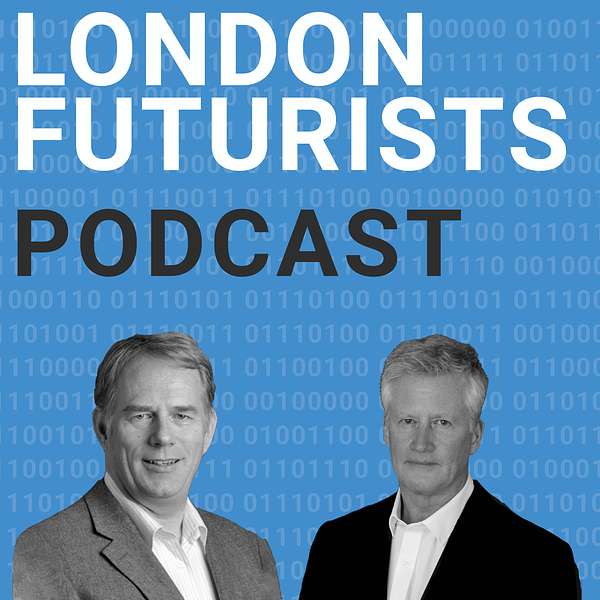
London Futurists
Anticipating and managing exponential impact - hosts David Wood and Calum Chace
Calum Chace is a sought-after keynote speaker and best-selling writer on artificial intelligence. He focuses on the medium- and long-term impact of AI on all of us, our societies and our economies. He advises companies and governments on AI policy.
His non-fiction books on AI are Surviving AI, about superintelligence, and The Economic Singularity, about the future of jobs. Both are now in their third editions.
He also wrote Pandora's Brain and Pandora’s Oracle, a pair of techno-thrillers about the first superintelligence. He is a regular contributor to magazines, newspapers, and radio.
In the last decade, Calum has given over 150 talks in 20 countries on six continents. Videos of his talks, and lots of other materials are available at https://calumchace.com/.
He is co-founder of a think tank focused on the future of jobs, called the Economic Singularity Foundation. The Foundation has published Stories from 2045, a collection of short stories written by its members.
Before becoming a full-time writer and speaker, Calum had a 30-year career in journalism and in business, as a marketer, a strategy consultant and a CEO. He studied philosophy, politics, and economics at Oxford University, which confirmed his suspicion that science fiction is actually philosophy in fancy dress.
David Wood is Chair of London Futurists, and is the author or lead editor of twelve books about the future, including The Singularity Principles, Vital Foresight, The Abolition of Aging, Smartphones and Beyond, and Sustainable Superabundance.
He is also principal of the independent futurist consultancy and publisher Delta Wisdom, executive director of the Longevity Escape Velocity (LEV) Foundation, Foresight Advisor at SingularityNET, and a board director at the IEET (Institute for Ethics and Emerging Technologies). He regularly gives keynote talks around the world on how to prepare for radical disruption. See https://deltawisdom.com/.
As a pioneer of the mobile computing and smartphone industry, he co-founded Symbian in 1998. By 2012, software written by his teams had been included as the operating system on 500 million smartphones.
From 2010 to 2013, he was Technology Planning Lead (CTO) of Accenture Mobility, where he also co-led Accenture’s Mobility Health business initiative.
Has an MA in Mathematics from Cambridge, where he also undertook doctoral research in the Philosophy of Science, and a DSc from the University of Westminster.
London Futurists
The Singularity Principles
Co-hosts Calum and David dig deep into aspects of David's recent new book "The Singularity Principles". Calum (CC) says he is, in part, unconvinced. David (DW) agrees that the projects he recommends are hard, but suggests some practical ways forward.
0.25 The technological singularity may be nearer than we think
1.10 Confusions about the singularity
1.35 “Taking back control of the singularity”
2.40 The “Singularity Shadow”: over-confident predictions which repulse people
3.30 The over-confidence includes predictions of timescale…
4.00 … and outcomes
4.45 The Singularity as the Rapture of the Nerds?
5.20 The Singularity is not a religion …
5.40 .. although if positive, it will confer almost godlike powers
6.35 Much discussion of the Singularity is dystopian, but there could be enormous benefits, including…
7.15 Digital twins for cells and whole bodies, and super longevity
7.30 A new enlightenment
7.50 Nuclear fusion
8.10 Humanity’s superpower is intelligence
8.30 Amplifying our intelligence should increase our power
9.50 DW’s timeline: 50% chance of AGI by 2050, 10% by 2030
10.10 The timeline is contingent on human actions
10.40 Even if AGI isn’t coming until 2070, we should be working on AI alignment today
11.10 AI Impact’s survey of all contributors to NeurIPS
11.35 Median view: 50% chance of AGI in 2059, and many were pessimistic
12.15 This discussion can’t be left to AI researchers
12.40 A bad beta version might be our last invention
13.00 A few hundred people are now working on AI alignment, and tens of thousands on advancing AI
13.35 The growth of the AI research population is still faster
13.40 CC: Three routes to a positive outcome
13.55 1. Luck. The world turns out to be configured in our favour
14.30 2. Mathematical approaches to AI alignment succeed
14.45 We either align AIs forever, or manage to control them. This is very hard
14.55 3. We merge with the superintelligent machines
15.40 Uploading is a huge engineering challenge
15.55 Philosophical issues raised by uploading: is the self retained?
16.10 DW: routes 2 and 3 are too binary. A fourth route is solving morality
18.15 Individual humans will be augmented, indeed we already are
18.55 But augmented humans won’t necessarily be benign
19.30 DW: We have to solve beneficence
20.00 CC: We can’t hope to solve our moral debates before AGI arrives
20.20 In which case we are relying on route 1 – luck
20.30 DW: Progress in philosophy *is* possible, and must be accelerated
21.15 The Universal Declaration of Human Rights shows that generalised moral principles can be agreed
22.25 CC: That sounds impossible. The UDHR is very broad and often ignored
23.05 Solving morality is even harder than the MIRI project, and reinforces the idea that route 3 is our best hope
23.50 It’s not unreasonable to hope that wisdom correlates with intelligence
24.00 DW: We can proceed step by step, starting with progress on facial recognition, autonomous weapons, and such intermediate questions
25.10 CC: We are so far from solving moral questions. Americans can’t even agree if a coup against their democracy was a bad thing
25.40 DW: We have to make progress, and quickly. AI might help us.
26.50 The essence of transhumanism is that we can use technology to improve ourselves
27.20 CC: If you had a magic wand, your first wish should probably be to make all humans see each other as members of
Elevate how you lead with insight from today’s most influential executives.
Listen on: Apple Podcasts Spotify

